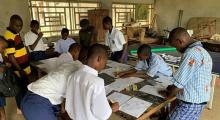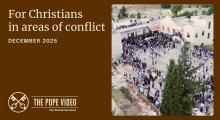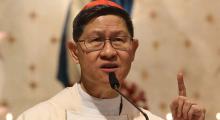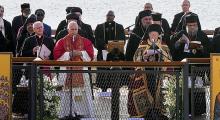Issued by the Catholic Center for Studies and Media - Jordan. Editor-in-chief Fr. Rif'at Bader - موقع أبونا abouna.org
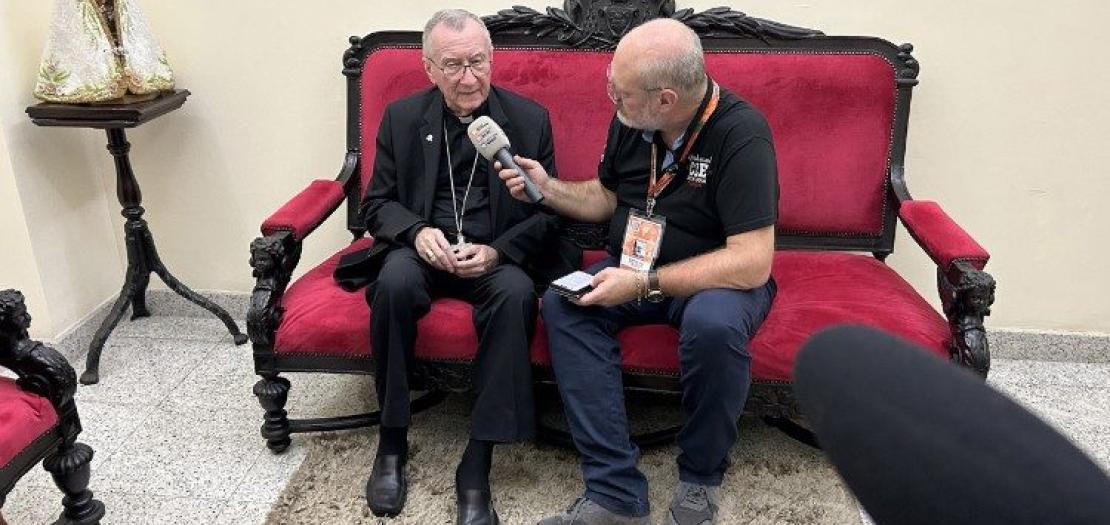
“Time is running short.” Quoting Saint Paul, Cardinal Pietro Parolin issued an appeal for urgent action to transform past climate commitments into concrete action. The Vatican Secretary of State is in Belém, capital of the Brazilian state of Pará, to lead the Holy See delegation at the “Climate Summit” ahead of the 30th United Nations Conference on Climate Change (COP30), scheduled for 10–21 November.
Speaking to Vatican News, the Cardinal warned that climate-related emergencies are now displacing more people than armed conflicts and stressed that addressing climate change can also become an opportunity to revive multilateral cooperation, which he said “has been in deep crisis for years.”
The Pope is concerned about the impact of climate change on the lives of millions of people, especially the poorest. What should be the priorities of local Churches in different parts of the world?
It is indeed a phenomenon that affects more and more people, and always in a negative way, especially the most vulnerable. In recent months, we have met with authorities from Pacific island nations who presented us with the tragic reality of their possible disappearance. We can all imagine what that means for their people.
From what I have read, there are now more displaced persons because of climate change than because of wars. It is truly an emergency situation. The Church is deeply engaged, beginning with the Holy See. We have recalled the great contribution made by Pope Francis through Laudato si' and Laudate Deum, and local Churches have taken up this commitment as their own.
I know that in view of COP30, the church in Brazil is working hard to raise awareness of these issues within communities and among individuals. There has also been collaboration among bishops’ conferences on different continents, creating a true movement. I believe the priority now is to emphasise above all the ethical dimension of this phenomenon.
Of course, we do not have the technical means or expertise to provide scientific solutions, although experts from the Secretariat of State and other Dicasteries follow these issues closely and take part in discussions and negotiations. But the fundamental contribution of the Holy See and of local churches is to raise awareness and offer an ethical response to the problem of climate change. This necessarily involves a major effort in education and formation.
You have met many world leaders. What concrete action should we expect from COP30 at the governmental level?
I think that is precisely the key point. Someone said to me this morning that we should not expect great proclamations from COP30, but rather the concrete commitment and determination of world leaders to implement what has already been promised—reducing carbon emissions, supporting vulnerable nations, and building resilience.
There are many areas in which action is needed, but what is essential now is to make those commitments real. As Saint Paul said, “time is short.” He said it about life, but it applies here too—the sense of urgency must be real.
Another essential aspect is multilateralism. The issue of climate change truly offers a chance to relaunch multilateral cooperation, which has suffered a serious crisis in recent years. These are the directions in which we must move and work together.
In recent days, you also visited projects involving children…
Yes, we visited Marituba, where there is a wonderful hospital founded by Bishop Aristide Pirovano, where lay missionary Marcello Candia once served. It is now run by the Poor Servants of Divine Providence of the Don Calabria family.
Among the initiatives we visited was the Fazenda da Esperança, a beautiful project for local children, many of whom come from socially vulnerable environments. It helps them learn a different way of relating to creation. I was very impressed by what I saw—their gardens, the biogas they produce from waste—truly remarkable. And it is the children who do this work. It helps them move away from negative influences and instead collaborate in creating what we all desire: a more just, healthy, and united world.
Can we start with the children?
Yes, absolutely. I met some of them, and they seemed very aware of what they were doing. It was moving to see. They acted as my guides during the visit, and I could sense how conscious they were of the challenge—and of their ability to respond to it through their own contribution


